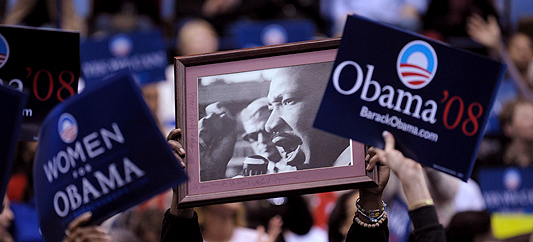US election diary: The race card
How US political parties have exploited racial tensions to capture the presidency.

 |
| Race and politics are, for many, inextricably bound in the United States [EPA] |
So much has been written about race in this presidential campaign.
But what the US news media almost never mention is that the entire system of politics in this country is dominated by race, and has been for over a century.
Let us go back to the fateful year of 1968 – the year Martin Luther King Jnr and Bobby Kennedy were assassinated, when rioters burned American cities and the major Tet offensive in Vietnam turned the American public decisively against that war.
In the 40 years prior to 1968, Republicans won only three elections for president and Democrats won seven.
In the years after, the situation has been completely reversed: Republican candidates have beaten Democrats in seven out of 10 elections (not counting 2000. But that is another story).
The race card
In 1968, Republican Richard Nixon narrowly defeated Democrat Hubert Humphrey in the presidential election. But the seeds of Nixon’s victory were sown four years earlier.
 |
|
Johnson, left with King, signed the US’s |
That is when President Lyndon B Johnson, over the vociferous opposition of Southern politicians from his own party, signed into law the Civil Rights Act, forbidding many forms of racial discrimination and guaranteeing equal rights for African-Americans.
Legend has it that as LBJ signed the bill, he turned to an aide and declared: “We have lost the south for a generation.”
Johnson’s Republican opponent in the 1964 election, Arizona Senator Barry Goldwater, voted against the historic Act. Five southern states duly awarded Goldwater their votes – although he lost to Johnson just about everywhere else.
The irony here is that, for most of the period between the end of the Civil War and the late 1960s, it was the Democratic Party that was most guilty of playing the race card in electoral politics.
In 1922, Democratic operatives spread rumours that Republican presidential candidate Warren G Harding had black forebears (Harding won despite the gossip).
It was the Democratic party that was instrumental in preventing black Americans from achieving their due political and legal rights.
Republicans, in the tradition of Abraham Lincoln, were historically much more open to black voters.
For decades, the Democrats dominated the south, and long-serving southern Democratic senators and congressmen dominated the US Congress.
They produced some truly hideous political racists, including Senator Theodore Bilbo of Mississippi, a proud member of the Ku Klux Klan, who once proposed deporting 12 million African-Americans to Liberia.
Power of the south
Even Democratic demigods like President Franklin D Roosevelt were timid when it came to opposing the power of racism in the south.
| Previous entries |
|
|
Roosevelt opposed efforts to pass a federal anti-lynching law in the 1930s, fearing he would lose southern votes in the 1936 election.
The venerable Senator Robert Byrd of West Virginia, a latter-day hero to liberals for his opposition to the war in Iraq, is a former Klan organiser who led the fight against Johnson’s Civil Rights Act in 1964.
But in 1968, the historic shift began. That year the so-called “Deep South” states of Arkansas, Louisiana, Mississippi, Georgia and Alabama voted for a breakaway independent candidate (and racist), the governor of Alabama, George Wallace.
The southern defection gave Nixon his victory. Now, Nixon may have been a deeply flawed human being, but he was a brilliant political tactician.
Upon taking office, he began to implement the “southern strategy”, a strategy that has served the Republican Party very well in the years since.
Frustrating progress
The essence of the strategy was to send clear but coded messages to southern whites that the Republican Party was the party of the white man and would do what it could to frustrate political and social progress by blacks.
Nixon liked to invoke the phrase “law and order” – signalling to whites that he would crack down on demonstrations, dissent and what they feared would be a wave of violence from newly enfranchised blacks.
At the same time, Nixon’s administration, critics say, sought to annul gains won by blacks through the courts.
The Supreme Court, headed by Chief Justice Earl Warren, was an object of hatred among southern whites for its decisions on behalf of civil rights for blacks.
In an effort to dilute the pro-civil rights consensus on the court, Nixon nominated segregation-supporting jurists Clement Hainsworth and G Harrold Carswell to the first available vacant seat.
Fortunately, northern Democrats and liberal Republicans joined forces to defeat the pair, but the message had been sent to southern whites: The Republican Party is watching out for you.
Exploiting fears
A Nixon political strategist and Justice Department official, Kevin Phillips, spelled out the strategy in a remarkably frank 1970 interview with the New York Times:
| In focus |
 In-depth coverage of the US presidential election |
“From now on,” Phillips said, “the Republicans are never going to get more than 10 to 20 per cent of the Negro vote and they don’t need any more than that … but Republicans would be shortsighted if they weakened enforcement of the Voting Rights Act.
“The more Negroes who register as Democrats in the South, the sooner the Negrophobe whites will quit the Democrats and become Republicans. That’s where the votes are. Without that prodding from the blacks, the whites will backslide into their old comfortable arrangement with the local Democrats.”
Republicans saw a way out of the electoral arithmetic that saw them lose election after election for most of the 20th century.
They simply abandoned the principles of the party of Lincoln and cynically seized the opportunity to exploit white racist fear and anger over the Democratic Party’s championing of civil rights.
Over the next two decades, the Republicans grew to dominate the south, as older Democratic politicians died or switched parties and younger white voters pledged allegiance to the Republicans.
It was just as Phillips had predicted – the more blacks aligned with the Democrats, the more whites joined the Republicans.
Sending the message
Of course, the process needed a little prodding now and then.
 |
| The US south supported former president Ronald Reagan [GALLO/GETTY] |
In 1980, Ronald Reagan chose to begin his campaign for the White House with a speech in Philadelphia, Mississippi – the place where civil rights workers James Chaney, Andrew Goodman, and Michael Schwerner were murdered by local Ku Klux Klansmen during the “Freedom Summer of 1964.
In his speech, Reagan declared: “I believe in states’ rights.”
States rights was the slogan employed by segregationists in the 1950’s and 1960’s who said the federal government had no right to impose desegregation and black voting rights on the South.
The none-too-subtle racist message had been sent and received by its target audience. The south voted enthusiastically for Reagan in two elections.
Reagan’s vice president, the awkward and out-of-touch New England Republican George H W Bush, was not the kind of good ‘ol boy politician who appealed to white southerners. So he hired himself a cynical political operative from South Carolina named Lee Atwater. He helpfully explained his methods in a 1981 interview published in Southern Politics in the 1990s.
“You start out in 1954 by saying, ‘Nigger, nigger, nigger,'” said Atwater. “By 1968, you can’t say ‘nigger’ – that hurts you. Backfires. So you say stuff like forced bussing, states’ rights, and all that stuff.
“You’re getting so abstract now [that] you’re talking about cutting taxes, and all these things you’re talking about are totally economic things, and a byproduct of them is blacks get hurt worse than whites.”
Dirty politics
Atwater managed Bush senior’s campaign against Governor Michael Dukakis of Massachusetts. A low point came with the infamous Willie Horton advertisement, shown on national television.
Willie Horton was a black Massachusetts prison inmate who escaped while on a weekend leave program. He traveled to Maryland and repeatedly raped a woman there. The ad featured Horton’s menacing-looking mug shot and attacked Dukakis for being soft on crime – another coded message aimed at white fears of black violence.
Conveniently, the ad was paid for by a group not officially controlled by the Bush campaign, so Bush and Atwater could claim they had no involvement.
But accounts from campaign staffers leave no doubt that Atwater was keenly interested in the Horton affair. Dukakis, who was a terrible campaigner, lost in a landslide.
So, Bush senior employed the southern strategy. But what about his son, our current president?
Surely the man who appointed prominent African-Americans such as Colin Powell and Condoleezza Rice to the highest of cabinet positions could not be accused of pandering to southern white fears or abandoning blacks in the south – could he?
You can ask tens of thousands of residents of New Orleans – the mostly black residents still struggling in the aftermath of hurricane Katrina – to answer that one.
The fact is, the younger Bush also owes his presidency to a classic race-baiting tactic employed against his opponent in the 2000 South Carolina primary. Rumours were spread – anonymously, and to this day, untraceably – that the opponent has fathered an illegitimate child by a black woman.
Finger-pointing and snide whispers focused on the opponent’s dark-skinned daughter, who was adopted as an orphaned infant from Bangladesh.
An enduring strategy
 |
| McCain faced race-baiting tactics in his 2000 presidential campaign [GALLO/GETTY] |
Bush’s opponent lost the primary, dashing his White House hopes. That opponent was John McCain.
He has vowed to run a clean, civil campaign. He denounced right-wing radio talk-show hosts who used Obama’s middle name – Hussein – in a ploy to suggest he is a Muslim (he is not).
He has even apologised for the fact that in 1983 he voted against making Martin Luther King Jnr’s birthday a federal holiday.
But with some likelihood that McCain’s opponent this fall will be a black man, Barack Obama, will the Republican race-attack machine be activated?
Most likely there will be little need for the Republicans to send coded messages, given that the very fact of Obama’s race will be enough to dissuade prejudiced white voters from supporting him anyway.
More likely, if he is nominated, Republican surrogates for McCain will try to raise questions about Obama’s patriotism, his decision not to wear an American flag lapel pin, his wife Michelle’s controversial remarks about not being proud of America for most of her adult life, and so forth.
Over the past several decades, once Republican states have shifted into the Democratic column as well – notably California, New Jersey, and this year, maybe, Ohio.
I can make one prediction in full confidence, however: Whichever Democrat is nominated, the South will vote Republican, again.
Lyndon Johnson was right, and Nixon’s southern strategy endures.
